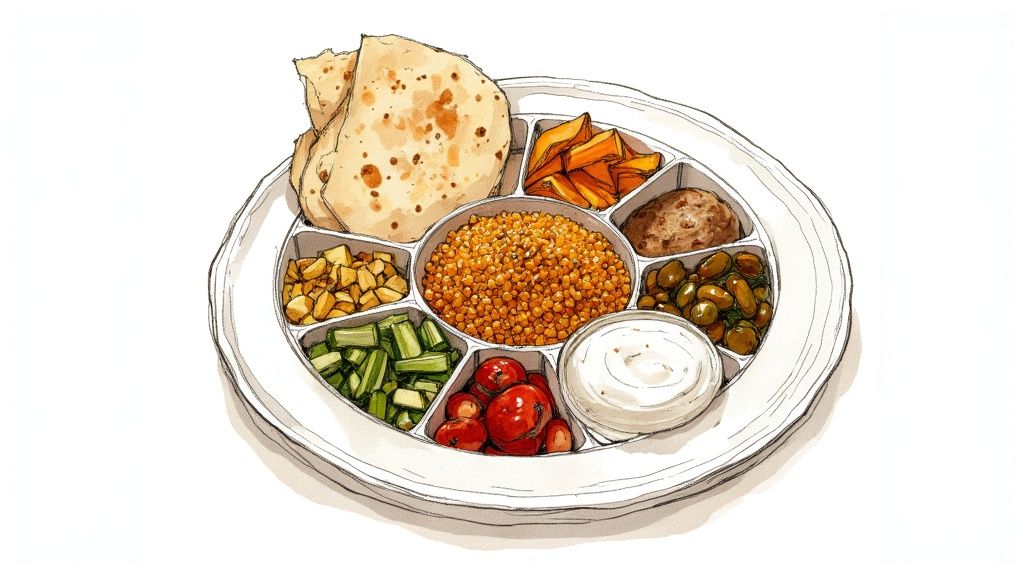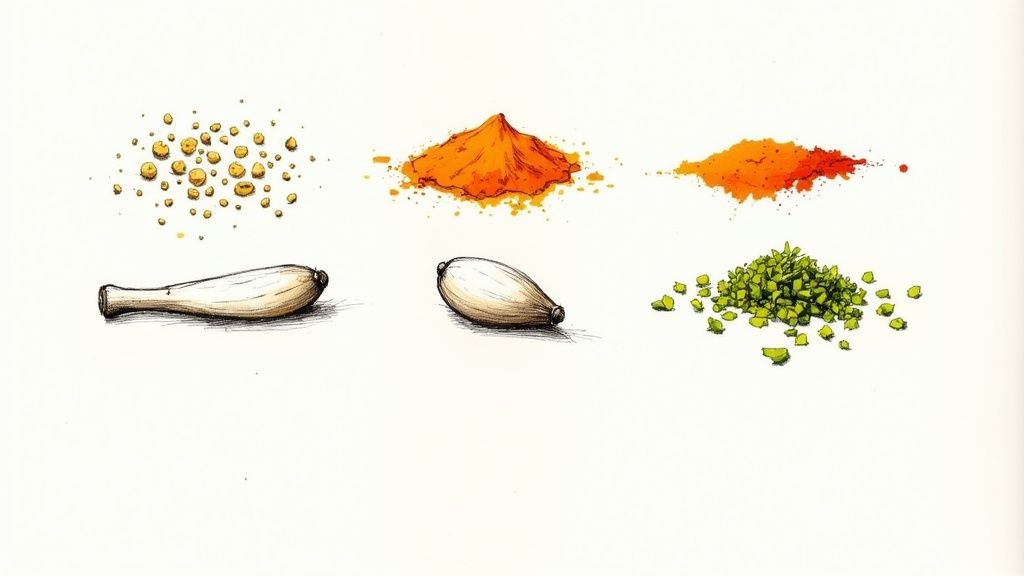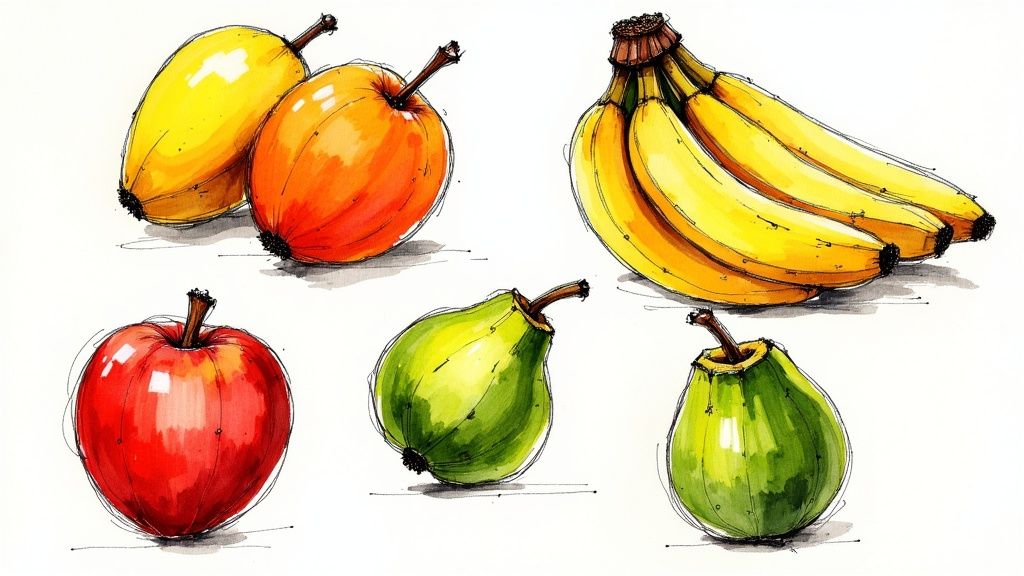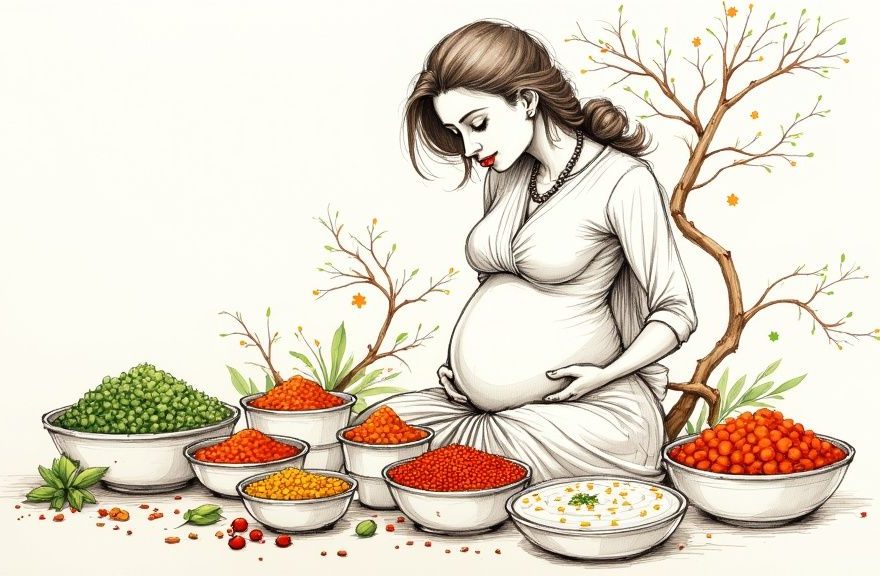Understanding Modern Pregnancy Nutrition Through an Indian Lens

The rich traditions of Indian cooking offer expecting mothers a treasure trove of nutritional wisdom that perfectly aligns with modern pregnancy dietary needs. Indian cuisine naturally emphasizes fresh, seasonal ingredients that provide essential nutrients for both mom and baby. The combination of whole grains, lentils, vegetables, and spices creates meals that are not just delicious but also packed with vitamins and minerals crucial during pregnancy.
The Science Behind Traditional Indian Pregnancy Foods
Take a closer look at everyday Indian ingredients, and you’ll find they’re perfectly suited for pregnancy nutrition. Fresh spinach and other leafy greens provide folate, which helps prevent birth defects. Lentils and beans offer iron and protein – exactly what expecting moms need to maintain healthy blood levels. But here’s the key: it’s not just about eating these foods, but preparing them properly to get the most benefits. Let’s explore how simple cooking methods can make these nutrients more available to your body.
Optimizing Traditional Cooking Methods for Pregnancy
Simple adjustments to classic Indian cooking techniques can boost the nutritional value of your meals. Instead of deep frying vegetables, try quick steaming to keep vitamins intact. Using iron cookware for cooking can naturally increase iron content in your food – especially helpful if you’re watching your iron levels. Think of it like tending a garden: the right care helps everything flourish, just as proper cooking methods help your body absorb more nutrients.
Addressing Real-World Challenges and Cultural Preferences
Every expecting mom faces unique challenges with food during pregnancy. Morning sickness might make certain dishes unappetizing, while family members might have strong opinions about what you should eat. The key is finding balance – adapting traditional recipes to suit your needs while keeping their nutritional benefits. Small changes, like having smaller, more frequent meals or adjusting spice levels, can make a big difference in managing pregnancy-related food challenges.
Building a Balanced Pregnancy Diet Plan Indian
A well-rounded Indian pregnancy diet should include these essential components:
- Fruits and Vegetables: Mix local seasonal produce for vitamins and minerals
- Whole Grains: Include ragi, bajra, and whole wheat for energy and fiber
- Pulses and Legumes: Add lentils, chickpeas, and beans for protein and iron
- Dairy Products: Choose milk, yogurt, and paneer for calcium needs
- Healthy Fats: Include ghee, nuts, and seeds for brain development
Creating healthy pregnancy meals doesn’t mean abandoning tradition – it’s about combining time-tested Indian cooking wisdom with current nutritional knowledge. Think of your pregnancy diet as a daily celebration of nourishing yourself and your growing baby, one mindful meal at a time.
Mastering Your First Trimester Food Journey

The first three months of pregnancy bring incredible changes to your body, including shifts in how you eat and what nutrients you need. Getting proper nutrition during this time helps create a strong foundation for your baby’s growth while helping you feel your best. Let’s explore how to build a healthy Indian pregnancy diet plan while managing common challenges like morning sickness.
Conquering Morning Sickness With Indian Remedies
When nausea hits, even your favorite foods can seem impossible to eat. Thankfully, Indian kitchen ingredients offer natural relief. Try sipping on fresh ginger tea or chewing small pieces of raw ginger – this spice has helped ease pregnancy nausea for generations. When you’re able to eat, start with gentle foods that are easy on your stomach like plain rice, simple khichdi, or soft idli.
Adapting Your Favorite Indian Dishes
You don’t have to give up the Indian foods you love – small changes can make them work better for your first trimester needs. Try reducing spice levels if strong flavors bother you. If cooking smells trigger nausea, opt for steaming or grilling instead of frying. These methods keep the nutrients while making dishes easier to handle. Most importantly, pay attention to what foods appeal to you right now – your body often knows what it needs.
Timing is Everything: Optimizing Nutrient Absorption
How often you eat matters just as much as what’s on your plate during these early months. Instead of three big meals, try eating smaller amounts more frequently throughout the day. This approach helps keep nausea in check and maintains steady blood sugar. Consider having a light protein-rich snack before bed, like warm dalia or milk with nuts, to help prevent morning sickness when you wake up.
Sample First Trimester Pregnancy Diet Plan Indian
Here’s a gentle meal plan featuring easy-to-digest Indian foods packed with essential nutrients:
| Meal | Suggestions |
|---|---|
| Breakfast | Poha with vegetables and a glass of coconut water |
| Mid-Morning | A handful of almonds and a banana |
| Lunch | Moong dal khichdi with a side of yogurt |
| Afternoon | Fresh fruit salad (avoid overly acidic fruits) |
| Dinner | Steamed rice with lightly spiced vegetable curry |
| Bedtime Snack | A glass of warm milk with a pinch of turmeric |
This plan provides the key nutrients you need during early pregnancy while being gentle on your stomach. Feel free to adjust portions and food choices based on what works for you, always focusing on fresh, whole ingredients. In the next section, we’ll look at ways to make traditional Indian dishes even more nutritious for pregnancy.
Transforming Traditional Indian Foods Into Pregnancy Powerhouses

Creating a healthy pregnancy diet with Indian foods is both an art and a science. Small changes in how you prepare traditional dishes can make a big difference in their nutritional value for you and your baby. While deep frying is common in Indian cooking, it can reduce the nutrients in vegetables that are essential during pregnancy. By making simple switches like steaming or light stir-frying instead, you can keep more of those important vitamins and minerals while still enjoying authentic flavors.
Cooking Methods That Preserve Pregnancy Power
Indian cuisine offers many cooking techniques that work well for pregnancy nutrition. Steaming is one of the best ways to prepare vegetables like spinach, carrots, and beans – it keeps their folate, vitamin C, and fiber intact. Another helpful tip is to use iron cookware, especially for dishes like dal or saag. The iron from the pot naturally transfers into your food, giving you an extra boost of this important mineral during pregnancy. These small but meaningful adjustments show how traditional cooking methods can support your prenatal needs.
Combining Ingredients for Enhanced Absorption
The genius of Indian cooking comes from pairing ingredients in ways that taste great and help your body absorb more nutrients. Take turmeric – this bright yellow spice does more than add color and flavor. When you combine it with black pepper, your body can better absorb its beneficial compounds. Another smart pairing is adding a squeeze of lemon juice to iron-rich foods like spinach since vitamin C helps your body take in more iron. These classic combinations reflect the deep nutritional wisdom built into Indian cooking traditions.
Modern Twists on Classic Recipes
You can make your favorite Indian dishes more pregnancy-friendly without losing what makes them special. Try mixing some fresh spinach into your dal or using brown rice instead of white rice in your meals. These simple swaps boost nutrition while keeping the authentic taste you love. This way you can stick to familiar comfort foods while getting the extra nutrients needed during pregnancy.
Sample Modifications for a Pregnancy Diet Plan Indian
| Traditional Dish | Modification | Benefit |
|---|---|---|
| Aloo Gobi | Steam the vegetables instead of deep frying them. | Preserves vitamins and reduces unhealthy fats. |
| Chicken Curry | Use lean chicken breast and reduce the amount of oil. | Decreases saturated fat intake while maintaining protein levels. |
| Vegetable Biryani | Use brown rice instead of white rice. | Increases fiber and nutrient content. |
| Dal Makhani | Reduce the amount of cream and butter. | Lowers saturated fat intake while still enjoying the flavors of this classic dish. |
With these thoughtful changes to cooking methods and ingredients, you can turn everyday Indian dishes into nutritional powerhouses that support a healthy pregnancy. These adjustments help ensure you get the most benefit from your meals while keeping the authentic flavors you crave.
Creating Trimester-Specific Meal Plans That Work

Your nutritional needs change significantly throughout pregnancy, much like a growing plant needs different nutrients at different stages. While a balanced Indian diet forms the foundation, adapting your meals to match each trimester’s unique requirements helps support your baby’s development. Let’s explore practical meal planning strategies for each stage of pregnancy.
First Trimester: Navigating Nausea and Nourishment
Morning sickness can make eating challenging during the first trimester, but getting proper nutrition is crucial for your baby’s early development. Focus on simple, easily digestible foods that provide essential nutrients, especially folate to prevent neural tube defects. Light meals like poha, idli, and khichdi work well when you’re feeling queasy. Adding folate-rich leafy greens when possible helps meet nutritional needs. Many women find that eating smaller portions more frequently helps manage nausea better than three large meals.
Second Trimester: Fueling Growth and Energy
As nausea subsides, your second trimester brings increased energy and appetite – perfect timing since this is when your baby grows rapidly. Your meals should now include more protein for tissue development and calcium for bone growth. Include plenty of dal, paneer, and nuts in your daily diet. To prevent anemia, eat iron-rich foods like spinach and dates. A helpful tip: pair these with vitamin C-rich fruits like oranges to help your body absorb iron more effectively.
Third Trimester: Preparing for Birth
During the final trimester, your baby’s brain development speeds up while bones continue strengthening. Focus on foods rich in omega-3 fatty acids, calcium, and vitamin D. Good options include fish (if you eat non-vegetarian food), flaxseeds, and dairy products. Keep up your iron and protein intake too – your blood volume is still increasing, and you need extra energy for the upcoming delivery. Small, frequent meals help manage the discomfort of a growing belly.
Sample Weekly Pregnancy Diet Plan Indian (Trimester-Specific)
| Trimester | Sample Meal Plan (Vegetarian) |
|---|---|
| First | Breakfast: Poha with vegetables, Coconut Water Lunch: Moong Dal Khichdi, Yogurt Dinner: Steamed Rice, Lightly Spiced Vegetable Curry |
| Second | Breakfast: Oats with Nuts and Fruits, Milk Lunch: Quinoa Salad with Mixed Vegetables, Paneer Curry Dinner: Whole Wheat Roti, Dal Makhani (reduced fat), Steamed Vegetables |
| Third | Breakfast: Ragi Dosa, Coconut Chutney Lunch: Vegetable Biryani (brown rice), Raita Dinner: Multigrain Roti, Palak Paneer, Dal |
Remember that every pregnancy is different. While this meal plan provides a good starting point, work with your doctor or a nutritionist to create a personalized plan that fits your specific needs and food preferences. The key is finding nutritious foods you enjoy eating and can manage during each stage of your pregnancy.
Making Smart Food Choices: What to Embrace and What to Avoid
Figuring out what to eat during pregnancy can feel confusing, especially when balancing traditional Indian dietary advice with modern nutritional guidance. Let’s break down which foods will best support you and your baby’s health, and which ones you’ll want to be careful with.
Foods to Enjoy: Nutritional Powerhouses for Pregnancy
The traditional Indian diet offers many excellent choices for pregnancy nutrition. Here are the key foods to include regularly:
- Leafy Green Vegetables: Make spinach, fenugreek leaves (methi), and amaranth leaves regular additions to your meals. These greens are rich in folate, which helps prevent birth defects.
- Fruits: Enjoy mangoes, bananas, and oranges daily. For instance, mangoes provide Vitamin C that helps your body absorb iron better.
- Lentils and Pulses: Fill your plate with dal, rajma, and chana. These provide the protein and iron you need as your blood volume increases.
- Dairy Products: Include milk, yogurt, and paneer regularly – they give you calcium for your baby’s growing bones.
- Whole Grains: Choose brown rice, whole wheat rotis, and traditional grains like ragi and bajra for steady energy and fiber.
- Nuts and Seeds: Snack on almonds, walnuts, and flaxseeds. These provide healthy fats that support your baby’s brain development.
- Healthy Fats: Cook with moderate amounts of ghee, coconut oil, and mustard oil to support overall health.
Foods to Approach With Caution: Minimizing Risks During Pregnancy
While Indian cooking offers many healthy options, some foods need extra care during pregnancy:
- Raw or Undercooked Foods: Skip raw or undercooked meat, seafood, and eggs. This includes certain street foods that might not meet food safety standards.
- High-Mercury Fish: Stay away from fish like king mackerel and swordfish – their mercury levels could affect your baby’s developing nervous system.
- Unpasteurized Products: Choose only pasteurized dairy and juices to avoid harmful bacteria.
- Caffeine and Sugar: Keep tea, coffee, and sugary drinks to a minimum.
- Certain Herbs and Spices: Check with your doctor about any traditional Indian spices and herbs you use regularly, as some may not be pregnancy-safe.
Food Safety and Hygiene: Essential Practices for a Healthy Pregnancy
Good food safety habits are extra important when you’re pregnant:
- Wash Produce Thoroughly: Give all fruits and vegetables a good wash to remove dirt and bacteria.
- Cook Food Well: Make sure all meat dishes are cooked completely through.
- Store Food Safely: Put leftovers in the fridge quickly and don’t eat food that’s been sitting out too long.
Remember that eating well during pregnancy isn’t about strict rules – it’s about making choices that keep both you and your baby healthy. The traditional Indian diet offers plenty of nutritious options that you can enjoy throughout your pregnancy. Focus on eating a variety of fresh, well-prepared foods while being mindful of food safety.
Maximizing Nutrition Through Smart Hydration and Supplementation
A healthy pregnancy requires proper hydration, which affects everything from your daily energy to the production of amniotic fluid around your baby. While drinking plain water is important, you can make hydration more interesting and nutritious by incorporating traditional Indian beverages into your pregnancy diet. This simple change allows you to enjoy flavorful drinks while giving your body and your growing baby essential nutrients. When combined with smart supplementation choices, you can create a complete nutritional foundation for a healthy pregnancy.
The Power of Traditional Indian Drinks
Indian traditional drinks offer much more than just refreshments – they provide key vitamins and minerals that support pregnancy health. Fresh coconut water, for instance, contains natural electrolytes that help maintain fluid balance, which becomes especially important as your blood volume increases during pregnancy. Many Indian families rely on buttermilk as a daily drink since it provides calcium for bone health and beneficial probiotics for digestion. The South Indian drink panakam, made with jaggery, lemon, and ginger, can help ease nausea while providing natural energy. These are just a few examples of the many nourishing beverages found in Indian cuisine.
Smart Supplementation: Filling Nutritional Gaps
Even with careful meal planning, pregnancy often requires supplements to meet increased nutritional needs. For example, folate plays a critical role in preventing birth defects early in pregnancy, so doctors typically recommend a supplement even for women eating folate-rich foods. Many pregnant women also need iron supplements since the body requires much more iron to support increased blood production. Before starting any supplements, speak with your doctor or registered dietitian about your specific needs. They can guide you on proper dosages and help you avoid any interactions with medications or foods. Think of supplements as backup nutrition that ensures you and your baby get essential nutrients even on days when eating well is challenging.
Creating Nutrient-Rich Beverage Combinations
You can boost the benefits of your daily drinks by combining traditional ingredients in creative ways. Adding fresh lemon to water not only improves the taste but also helps vitamin C your body absorb iron more effectively. For an extra dose of folate and iron, try blending spinach into fruit smoothies – the fruit flavors make the greens barely noticeable. If morning sickness is an issue, especially in the first three months, try adding a small amount of ginger to warm water or tea. These simple additions turn basic beverages into nutrient-packed drinks that support your pregnancy diet.
Recognizing Signs of Proper Hydration
Staying well-hydrated is essential during pregnancy, particularly given India’s warm climate. When you’re drinking enough fluids, your urine should be light in color, your bowel movements should be regular, and you should feel energetic throughout the day. Pay attention if you notice dark urine, headaches, dizziness or unusual fatigue, as these may signal dehydration. Since each woman’s hydration needs vary based on factors like daily activity and local weather, check with your healthcare provider about the right amount of fluids for your situation.
Are you ready to embrace a healthier, more fulfilling pregnancy journey? Join Pregnancy 101 today and gain access to expert-led live sessions on prenatal care, postnatal care, Garbh Sanskar, and much more. With flexible scheduling and experienced instructors, Pregnancy 101 gives you the knowledge and support you need for an informed and joyful pregnancy.

